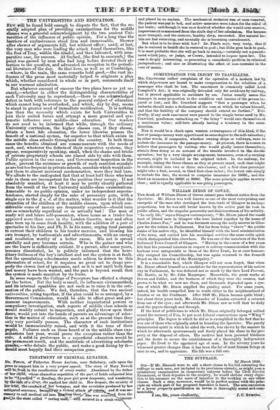- THE UNIVERSPITES AND EDUCATION.
ItEw will be found hold enough to dispute the flict, that the re- cently adopted plan of providing examipations for the middle classes was a graceful acknowledgment by the two ancient Uni- versities of the influence of public opinion. For a long time the barriers of exclusiveness stood' firm and immoveable. Shower after shower of arguments fell; but without ellbet ; until, at last, the very men who were leading the attack found themselves, like the foes of Troy, ivithin the citadel, and then laboured, with com- parative ease, for success. At Oxford; (the first to succumb,) the point was gained by men who had long before devoted their at- tention to the question, and advocated its reception in the periodi-
cal literature or the day. So. that here, as well as at Cambridge, —where, in the main, the same remarks hold good,—the vast in- fluence of" the press most materially helped to originate a plan which,, whether considered in whole or in part, commends itself' to our warmest admiration.
But whatever amount of success the two plans have as yet se- cured,—whether in. either the distinguishing characteristics of
each University may be reproduced,—there is one acknowledged defect in both with reference to the general subject of education which cannot long be overlooked, and which, day by day, seems to stand in greater need of immediate rectification. It is. nothing less than the necessity which exists for both Universities to join their united forces and attempt 'a more general and sys- tematic influence over middle-class education. Our readers do not need to be informed- that while, through the ordinary University curriculum, the higher classes can, if they choose, obtain a bona fide education, the lower likewise possess the benefit of a national system, far superior to that which exists in the middle class schools throughout the country. In both these
eases the benefits obtained are commensurate with the needs of
each, and, whatever the defects of their respective systems, they appear, comparatively speaking, small, when the shams and tricks of private proprietary schools are placed side by side with them. Public opinion in the one case, and Government inspection in the other, prevent the existence or growth of such manifest scandals as are but too frequent in private schools, scandals which wouhisub- ject them to almost universal condemnation, were they laid bare. We allude to the undisputed fact that at least half those whohear rule in them are incompetent for the position they occupy. If not absolutely manifest, at least it may be pretty clearly gathered. from the result of the two University middle-class. examinations.
Amenable to no public opinion, under no independent superin-
tendence, started simply for the sake of pecuniary gain, with a single eye to the s. d. of the matter, what wonder is it that the education of the children of the middle classes, upon- which con- siderable sums of money are frequently expended—should turn out so remarkably superficial or so actually bad ! The man of ready wit and brave self-possession, whose name as a trader has appeared more than once in the London Gazette, may and often does turn up in some fresh locality, with the addition of a pair of speetaeles to his face, and Ph. D. to his name, urging fond parents to entrust their children to his tender mercies, and blowing his own trumpet, by testimonials and advertisements, with an energy and resolution worthy of a better cause. His net is spread carefully and pray becomes certain. Who is the gainer and who are the losers is sufficiently evident. If a parent, after some years, becomes dissatisfied, he is politely informed that the here- ditary dullness of the boy's intellect and not the system is at fault. But the speculating schoolmaster needs seldom be driven to this alternative of retort, for it requires no great art to drape pro- perly the cloven foot of ignorance, and so it is not until both time and money have been wasted, and the past is beyond recall that the system is made manifest by its fruits. In some respects the College of Preceptors has effected a change for the better. But the body is small, its influence circumscribed,. and its internal squabbles are not such as to raise it in the esti- mation of the public. We feel, therefore, that the two ancient universities, acting together, if the plan could be so arranged, by a Government Commission, would be able to effect great and per- manent improvements. With neither inquisitorial powers or compulsory investigation, such reports of middle class schools as would readily submit to inspection, and gladly throw open their doors, would put into the hands of parents an advantage of selec- tion in the matter of education, such as at the present time they only very partially possess. The character of such institutions would be immeasurably raised, and with it the tone of their pupils. Failures such as those heard of in the middle class exa-
minations last year, would prove the exception rather than the rule. A solid in preference to a. superficial education would. be the permanent result, and the multitude of advertising- scholastic quacks,—who delude the public, and make a good living by it— would most happily find their occupation gone.


























 Previous page
Previous page